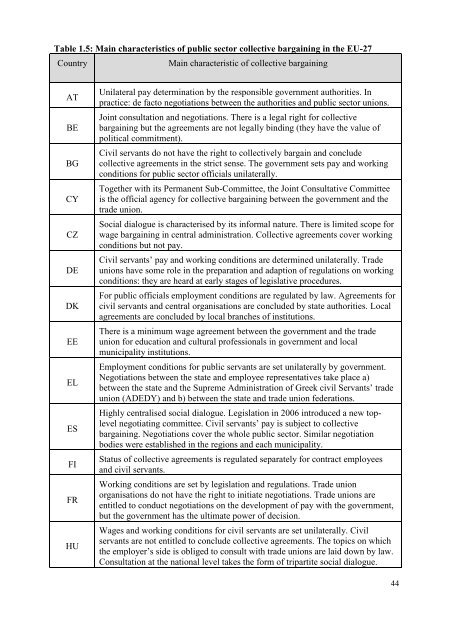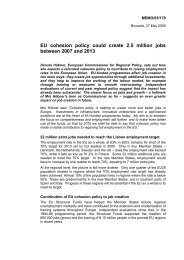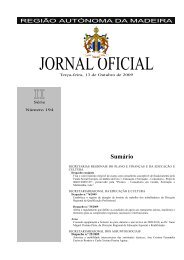Industrial Relations in Europe 2012 - European Commission - Europa
Industrial Relations in Europe 2012 - European Commission - Europa
Industrial Relations in Europe 2012 - European Commission - Europa
You also want an ePaper? Increase the reach of your titles
YUMPU automatically turns print PDFs into web optimized ePapers that Google loves.
Table 1.5: Ma<strong>in</strong> characteristics of public sector collective barga<strong>in</strong><strong>in</strong>g <strong>in</strong> the EU-27<br />
Country<br />
Ma<strong>in</strong> characteristic of collective barga<strong>in</strong><strong>in</strong>g<br />
AT<br />
BE<br />
BG<br />
CY<br />
CZ<br />
DE<br />
DK<br />
EE<br />
EL<br />
ES<br />
FI<br />
FR<br />
HU<br />
Unilateral pay determ<strong>in</strong>ation by the responsible government authorities. In<br />
practice: de facto negotiations between the authorities and public sector unions.<br />
Jo<strong>in</strong>t consultation and negotiations. There is a legal right for collective<br />
barga<strong>in</strong><strong>in</strong>g but the agreements are not legally b<strong>in</strong>d<strong>in</strong>g (they have the value of<br />
political commitment).<br />
Civil servants do not have the right to collectively barga<strong>in</strong> and conclude<br />
collective agreements <strong>in</strong> the strict sense. The government sets pay and work<strong>in</strong>g<br />
conditions for public sector officials unilaterally.<br />
Together with its Permanent Sub-Committee, the Jo<strong>in</strong>t Consultative Committee<br />
is the official agency for collective barga<strong>in</strong><strong>in</strong>g between the government and the<br />
trade union.<br />
Social dialogue is characterised by its <strong>in</strong>formal nature. There is limited scope for<br />
wage barga<strong>in</strong><strong>in</strong>g <strong>in</strong> central adm<strong>in</strong>istration. Collective agreements cover work<strong>in</strong>g<br />
conditions but not pay.<br />
Civil servants’ pay and work<strong>in</strong>g conditions are determ<strong>in</strong>ed unilaterally. Trade<br />
unions have some role <strong>in</strong> the preparation and adaption of regulations on work<strong>in</strong>g<br />
conditions: they are heard at early stages of legislative procedures.<br />
For public officials employment conditions are regulated by law. Agreements for<br />
civil servants and central organisations are concluded by state authorities. Local<br />
agreements are concluded by local branches of <strong>in</strong>stitutions.<br />
There is a m<strong>in</strong>imum wage agreement between the government and the trade<br />
union for education and cultural professionals <strong>in</strong> government and local<br />
municipality <strong>in</strong>stitutions.<br />
Employment conditions for public servants are set unilaterally by government.<br />
Negotiations between the state and employee representatives take place a)<br />
between the state and the Supreme Adm<strong>in</strong>istration of Greek civil Servants’ trade<br />
union (ADEDY) and b) between the state and trade union federations.<br />
Highly centralised social dialogue. Legislation <strong>in</strong> 2006 <strong>in</strong>troduced a new toplevel<br />
negotiat<strong>in</strong>g committee. Civil servants’ pay is subject to collective<br />
barga<strong>in</strong><strong>in</strong>g. Negotiations cover the whole public sector. Similar negotiation<br />
bodies were established <strong>in</strong> the regions and each municipality.<br />
Status of collective agreements is regulated separately for contract employees<br />
and civil servants.<br />
Work<strong>in</strong>g conditions are set by legislation and regulations. Trade union<br />
organisations do not have the right to <strong>in</strong>itiate negotiations. Trade unions are<br />
entitled to conduct negotiations on the development of pay with the government,<br />
but the government has the ultimate power of decision.<br />
Wages and work<strong>in</strong>g conditions for civil servants are set unilaterally. Civil<br />
servants are not entitled to conclude collective agreements. The topics on which<br />
the employer’s side is obliged to consult with trade unions are laid down by law.<br />
Consultation at the national level takes the form of tripartite social dialogue.<br />
44

















